|
 Secure Site
Secure Site
|
 |
 Shin-hanga print, Summer Beauty by Hashiguchi Goyo, 1920 We have created the perfect yoga and meditation timer! Our Digital Zen Alarm Clock® has been specifically designed with yoga practitioners in mind. The clock can be set to produce a beautiful Tibetan bell-like chime repeatedly at any set interval.
We know that many yoga practitioners use beeping kitchen timers to signal periodic position changes. However, the Digital Zen Alarm Clock’s acoustic pure-tone chime is more appropriate for use in spiritual practices such as yoga. The chime’s B tone has been hand tuned using the ancient Pythagorean method — the clock’s tone is the same as that produced by tuning forks used by musical therapists. And not only does the Digital Zen Alarm Clock sound beautiful, it looks beautiful as well. Its solid hardwood case is an attractive addition to an altar or mantle.
 Bamboo yoga and meditation timer, designed especially for yoga practitioners Because of the popularity of our original Zen Alarm Clock we were flooded with requests for a digital version that can be used as a countdown and interval timer.
Now & Zen’s Yoga Timer Shop
1638 Pearl Street
Boulder, CO 80302
(800) 779-6383
Posted in Meditation Timers, Meditation Tools, Now & Zen Alarm Clocks, Progressive Awakening, Well-being, Yoga Timer, Yoga Timers by Now & Zen
 Mindfulness Practice - Meditation I sat cross-legged on the living-room rug, closed my eyes, took a deep breath, and tried to quiet my mind. Alas, random thoughts persisted, flickering about like fireflies on a summer evening. After five minutes, I abandoned my Zen pose. I would have rather folded laundry or gone on a 3-mile run—anything with more tangible results.
One day, I shared my frustrations about meditating correctly with a practiced teacher and learned that there was no wrong way to meditate—it would be like breathing wrong. I was trying too hard. She suggested I come to her meditation group, but meditating with a dozen other people sounded distracting, and sitting in a library chair wasn’t exactly my definition of bliss. But I liked her “can’t do it wrong” approach, so I ventured to the library basement for this “meditation spa.”
The first thing I noticed was the particularity of the circular chair positioning. As a writer, I appreciated such attention to flow. A more sporadic placement, like an awkward transition or misplaced passage, would have detracted from the whole. Mood music, dimmed lights, and quiet conversation helped me relax. Sensing we were ready, our instructor asked us to close our eyes and inhale deeply. On the exhale, we joined her in chanting om, releasing our breath for as long as possible. We did this three times, our voices overlapping in one long melodious note, as tranquil as a wind chime. The chanting slowed my breathing and stilled my mind for a short time, and when thoughts popped up, I did my best to ignore them. Then the instructor asked us to drink in a white light, each breath filling us up like a balloon. After about 20 minutes, she gently “brought us back,” though there was no place to come back from with the sound of a Zen Meditation Timer. We’d never left the library basement.
What I discovered was that meditating perfectly is not only unattainable—it’s missing the point. It’s not the mantra, the breathing, the teacher, or the time of day; instead, it is the simplicity of peace and silence I found within myself through meditating. Now when I meditate, I don’t get upset when I worry or when I can’t empty my mind. Instead, I try to open myself a little more each time to the stillness that has always been there.
adapted from Natural Solutions Magazine, July 2008 by Susan Lembo Balik
The Walnut Digital Zen Clock’s long-resonating Tibetan bell-like chime makes waking up and meditating a beautiful experience! When the clock’s alarm is triggered, the acoustic chime bar is struck just once … 3-1/2 minutes later it strikes again … chime strikes become more frequent over 10 minutes … eventually striking every 5 seconds until shut off.
Our Meditation Chime Timer also serves as a countdown and interval timer for yoga, meditation, bodywork, etc.; and it can also be set to chime on the hour as a tool for “mindfulness.”
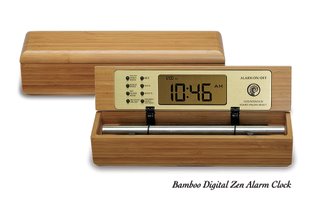 Zen Meditation Timer in Bamboo with Natural Acoustic Chime Now & Zen’s Meditation Chime Timer Shop
1638 Pearl Street
Boulder, CO 80302
(800) 779-6383
Posted in intention, Meditation Timers, Meditation Tools, mindfulness practice, Zen Timers
 what do our dreams mean? Your nighttime revelries could hold the key to your health.
By Jeanne Ricci
It has happened to all of us: You sit up in bed after a doozy of a dream and wonder What did that mean? Mankind’s fascination with dreams has a long history. In fact, one of the world’s oldest surviving documents, an Egyptian papyrus, contains dream interpretations. Most ancient cultures believed dreams were communications from deities or departed souls. More recently, psychologists Sigmund Freud and Carl Jung paved the way for using dream analysis when treating patients, believing dreams could shed light on the workings of the unconscious mind. Today, many medical and psychiatric professionals believe dreaming can help us move beyond depression and grief and even identify underlying health issues.
As long as you are sleeping, you are dreaming. That’s right, everyone dreams—even if you don’t remember your nightly adventures. “Most dreams occur during REM (rapid eye movement) sleep, which replenishes certain neurotransmitters,” writes Deirdre Barrett, PhD, assistant professor of psychology at Harvard Medical School, in her book The Committee of Sleep (Crown, 2001). Since you enter the light sleep stage characterized by REM every 90 minutes, you’ll likely have four to five dreams a night, assuming you sleep for eight hours. “Interfering with REM, and thus dreaming, interferes with creativity, problem-solving capability, memory, and, in extreme situations, even immune function and body temperature,” says Barrett. You don’t have to remember your dreams to reap some of the benefits, but if you can recall them, your dreams could tell you a lot. (For tips to enhance dream recall, see “To Dream, Perchance to Remember” on page 73.) “But stay away from dream dictionaries that would have you believe that one symbol means one thing,” Barrett warns. Instead, she recommends Our Dreaming Mind by Robert L. Van de Castle (Ballantine Books, 1995), which focuses on dream theory and learning to work with your dreams. If you really dive deeply into your dream life, the payoff is multifold. You can tap into more clarity and creativity, feel less depressed and stressed, and maybe even be able to predict disease.
Tap into your dream tank
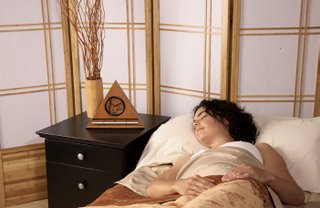 zen clocks help remind you of your dreams With a little effort, you can draw creative inspiration for both your professional and personal life from dreams. Need help solving a problem at work or making a decision for your household? Dreams can shed light on information stored in your brain and also help you think outside the box. “If you are stuck in your waking life on any sort of issue, then dreams can help you come to a resolution,” says Barrett. In fact, artists, writers, and philosophers such as René Descartes and Samuel Taylor Coleridge have used a method called dream incubation to nurture their creative processes.
To get started incubating dreams, write a question such as Which apartment should I rent? or How can I increase productivity at work? on a piece of paper and place it by your bed. Review the question before going to sleep and tell yourself you want to dream about it. Keep a pen and paper on the nightstand. For the next several nights, every time you wake up, lie quietly and try to recall your dreams. Write down anything you remember—events, places, characters, and feelings. The answer to your question may appear obvious after one night, or it could come to you over time as you piece together recurring ideas and themes. As with anything, the more you practice incubating and analyzing dreams, the more insight you’ll draw.
The blues are but a dream
 Hiroshige, The Moon Over a Warterfall An active dream life can help you shake the blues. Research conducted at Rush Presbyterian St. Luke’s Medical Center in Chicago found that people who were depressed after a divorce felt better more quickly if they had, and were able to recall, both good and bad dreams about their ex-spouses. Rosalind Cartwright, PhD, director of the research program, and her colleagues found that as dreams involving an ex-spouse became less negative and less frequent, their subjects’ depression lifted. This is not to say that people who don’t remember their dreams are more likely to be depressed—but people who do remember may recover more quickly from traumatic events such as divorce.
Similarly, people suffering from post-traumatic stress disorder (PTSD) are often encouraged to use dreams to aid their recovery. PTSD sufferers commonly have nightmares about real events that prolong their trauma. If they can successfully redirect a negative dream and change its outcome via hypnosis or self-suggestion at bedtime, it not only stops the nightmares but also lessens other symptoms, like heightened startle responses and daytime flashbacks, says Barrett. This method can also quash recurring nightmares for people who don’t have PTSD. Throughout the day and before bedtime, think of the dream and vividly imagine a more positive outcome. With determination, you can eventually change the content of your nightmare.
The interpreter of maladies
Is your body trying to tell you something? “Someone might dream she has cancer or some disease and then later see the first clinical sign of it,” says Barrett. The idea that our subconscious knows about illness before our conscious mind goes back to Hippocrates. Our body, it seems, often sends early warning signals that don’t always reach our consciousness. When we sleep and dream, the sensory overload that’s now part of everyday life gets blocked, making our psyches more receptive to messages our bodies send.
Shanee Stepakoff, a clinical psychologist in New York City, experienced this firsthand. “I had a mark on my cheek that looked like a freckle. I asked a few different dermatologists about it, and they all said it was nothing, but I kept having dreams about it,” she says. Stepakoff continued to see cancer metaphors in her dreams. “Finally, I had a very intense dream in which the word check kept appearing in various contexts (checkbook, write a check),” Stepakoff says. She believed this was her psyche urging her to get the spot on her cheek checked. Her doctor didn’t want to do a biopsy, but she insisted. Sure enough, it came back as melanoma—luckily, they caught it in time.
“I believe that the psyche gives us messages when there is something important that we need to pay attention to—it could be about our health, but it could also be about a relationship, a person in our lives, or a job situation,” says Stepakoff. “I think it is part of how our psyches help us survive and, ideally, to become more whole.”
Jeanne Ricci is a writer living in New York City.
To Dream, Perchance to Remember
It’s hard to learn from your dreams if you can’t remember them. But even if you draw a blank every morning, don’t fret. Follow these steps, recommended by Deirdre Barrett, PhD, assistant professor of psychology at Harvard Medical School, and Andrew Holecek, a dream workshop teacher at Colorado’s Shambhala Mountain Center, to enhance your dream recall.
* Get seven to eight hours of sleep a night. The more you sleep, the more dreams you will have, increasing the likelihood you’ll remember one of them.
* Throughout the day and right before you fall asleep, remind yourself of your intention to remember your dreams.
* Keep a pen and paper by your bed. A dream journal can encourage recall and, at the very least, help you document any fragment you do remember upon waking.
* When you first wake up, don’t move. Lie quietly and reflect on any image that comes to mind. Sometimes a whole dream scenario will come back to you.
* Be mindful during the day, not just about dreams but about everything going on around you. The lucidity you cultivate in waking life will translate to your dream life.
* Set an alarm to wake you every two hours throughout the night. When the alarm sounds, write down as much as you can remember about the dream you were just having.
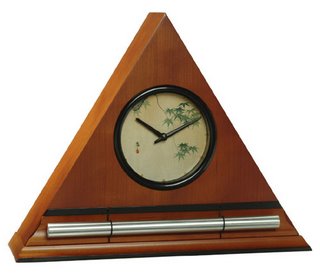 Zen Alarm Clocks for a Soothing Wake-up Now & Zen Headquarter Store
1638 Pearl Street
Boulder, CO 80302
(800) 779-6383
Posted in Chime Alarm Clocks, sleep, Sleep Habits
Get a good night’s sleep by retiring old habits and starting a gentle, bedtime yoga practice, also set your Zen Clock to wake you in the morning relaxed and refreshed with gentle chimes.
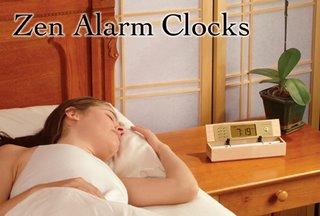 Ease into Sleep The key to healing sleep disorders, Dyer says, is to cultivate healthy habits. “Regularity and rhythm are friends to sleep,” she explains. “Going to sleep and waking up at the same time each day, eating at the same time each day, doing yoga at the same time each day. The more rhythmic your life is, and the less scattershot it is, the easier it is to sleep well.”
Whether you experience chronic or intermittent insomnia, a program of relaxing asana and easy meditation performed at bedtime can help you slow down mind and body and ease the transition into slumber, says yoga teacher and sleep scientist Roger Cole.
And then, when it’s time to sleep, cover your eyes with something that provides both darkness and very gentle pressure, like an eye bag and set your Zen Alarm Clock knowing that you will wake gently in the morning to a chime clock.
By Rachel Brahinsky – Yoga Journal Magazine
 Visit us in Boulder - Soothing Clock Store -- Colorado Now & Zen’s Soothing Clock Store
1638 Pearl Street
Boulder, CO 80302
(800) 779-6383
Posted in Now & Zen Alarm Clocks, Progressive Awakening, Sleep Habits
 Do I Really Need a Timer? Time is such a drag, especially when you have entered that timeless state of bliss that sometimes arises when you meditate or practice yoga. Ideally, once you achieve samadhi through such practices, you can just go on and on with no concern for such petty worldly concerns such as what time it is. However, unless you’re a monk or nun, endless bliss can have a way of interfering with your life’s other commitments. This is why using a timer as an accoutrement to your spiritual practice can be both handy for you and a way of being considerate to others.
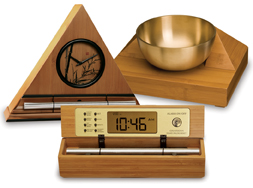 Do You Need a Meditation Timer?
Yet because time and timing can sometimes be a drag, it is important to make the best of it. And the best way to make time your ally is by using a clock/timer that is beautiful to both eye and ear. This is the role of the Zen Alarm Clock; it’s a practice timer and alarm clock housed in a beautiful hardwood case and featuring the long resonating and tranquil sounds of an acoustic chime or brass bowl-gong.
Used as a timer, the Zen Clock brings a graceful end to your practice session. And as an alarm clock it makes waking up an exquisite experience you will actually look forward to! To see and hear our entire line of Zen Clocks and timers, visit us at: www.now-zen.com, or stop by our headquarters store in downtown Boulder Colorado on Pearl Street.
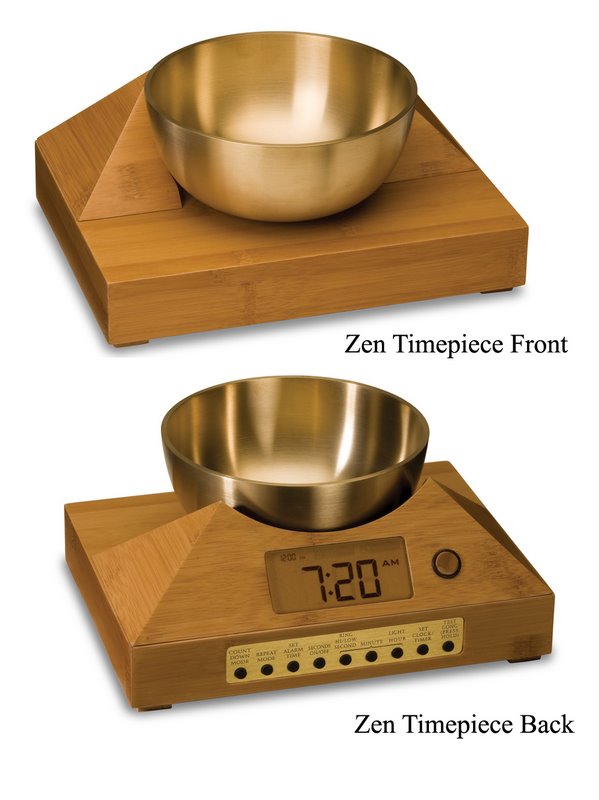 Timer Store - Boulder, CO
Now & Zen’s Timer Store
1638 Pearl Street
Boulder, CO 80302
(800) 779-6383
Posted in Uncategorized
 Kitagawa Utamaro, Komuraski of the Tamaya, House After a Bath, 1795 Perfect alarm clock gift makes waking up a calming and relaxing experience
Replace Your Loved Ones Alarm Clock, so that you don’t have to be awakened by their Frightening, Beeping Alarm Clock…
Are you tired of your wife’s alarm clock?
What makes this gentle awakening experience so exquisite is the sound of the natural acoustic chime, which has been tuned to produce the same tones as the tuning forks used by musical therapists. According to the product’s inventor, Steve McIntosh, “once you experience this way of being gradually awakened with beautiful acoustic tones, no other alarm clock will ever do.”
Boulder, Colorado—an innovative company has taken one of life’s most unpleasant experiences (being startled awake by your alarm clock early Monday morning), and transformed it into something to actually look forward to. “The Zen Alarm Clock,” uses soothing acoustic chimes that awaken users gently and gradually, making waking up a real pleasure. Rather than an artificial recorded sound played through a speaker, the Zen Clock features an alloy chime bar similar to a wind chime. When the clock’s alarm is triggered, its chime produces a long-resonating, beautiful acoustic tone reminiscent of a temple gong. Then, as the ring tone gradually fades away, the clock remains silent until it automatically strikes again three minutes later. The frequency of the chime strikes gradually increase over ten-minutes, eventually striking every five seconds, so they are guaranteed to wake up even the heaviest sleeper. This gentle, ten-minute “progressive awakening” leaves users feeling less groggy, and even helps with dream recall.
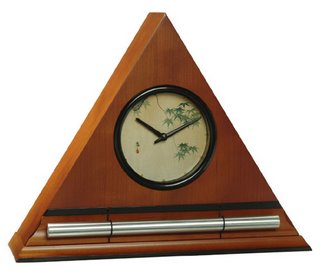 Replace your husband's alarm clock, choose The Zen Alarm Clock Now & Zen’s Gentle Chime Alarm Clock Store
1638 Pearl Street
Boulder, CO 80302
(800) 779-6383
Posted in Uncategorized
 winter self massage During winter, nature sighs deeply and burrows down for a long sleep. Like the denning bears and squirrels, use these cozy times to reduce stress. Especially in urban environments, we often become detached from this seasonal message. Continuing at a frenzied pace, we develop anxiety, high blood pressure, and digestive upset. To reduce stress, “in winter we focus a lot more on massage and nutrition,” says hydrotherapist Kristi Zimmer. Try this self-massage five minutes before bed and just after waking up in the morning: Set your Zen Chime Timer for 5 minutes. Lie on your back and make gentle circular motions around your belly with both hands, going clockwise as you breathe deeply. After five minutes of this, leave your hands on your stomach as you take 20 deep breaths, sending the breath to your organs. The deep breathing calms the body and mind, while the massage aids digestion.
adapted from Natural Solutions Magazine, January 2007 by Nora Isaacs
 Chime Timers in Bamboo with Natural Acoustic Chimes Now & Zen’s Natural Chime Timer Store
1638 Pearl Street
Boulder, CO 80302
(800) 779-6383
Posted in Bamboo Chime Clocks, Chime Alarm Clocks, intention, Meditation Timers, Meditation Tools, mindfulness practice, Natural Awakening, Well-being, Zen Timers
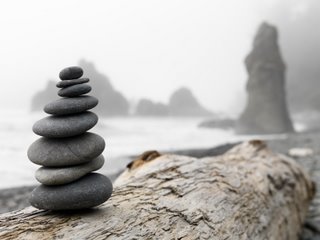 Meditation Timers by Now & Zen, Boulder, CO There is a great story about a Kundalin yogi who was determined to reach spiritual enlightenment. He would meditate each and everyday, and continue to meditate for longer and longer each day. As months and then years went by the now wise Kundalin yoga master meditated 22 hours per day. Unfortunately, not all of us can meditate for 22 hours a day, we do the best with the time we have. Finding balance is an important philosophy in a natural lifestyle. Balancing your meditation and your time are going to be important.
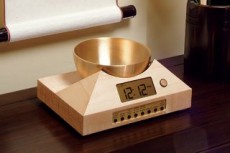 Zen Timers for Meditation by Now & Zen
On average for a beginner, the daily recommended time for meditation is 20 minutes. As you strengthen your meditation skills, you can begin to increase your time gradually. A great way to keep track of your time is to get a meditation clock timer. Our Zen Timepiece is a perfect tool for yoga, meditation, bodywork, or any other calming activity. The meditation clock timer can be set to strike its gong repeatedly at any time interval. Getting you prepared for 22 hours per day much like the wise Kundalin yoga master.
Our Zen Timepiece’s acoustic 6-inch brass bowl-gong clock is the world’s ultimate alarm clock, practice timer, and “mindfulness bell.“
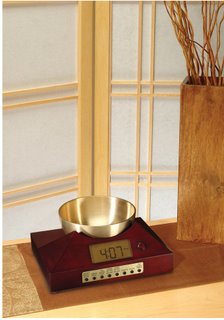 - Bowl Gong Meditation Timer – How Much Should You Meditate Daily?
Now & Zen’s Meditation Timer Store
1638 Pearl St.
Boulder, CO 80302
(800) 779-6383
Posted in Meditation Timers, Meditation Tools, Now & Zen Alarm Clocks, Zen Timers
 Eat right to sleep tight
By Ellen Kamhi PhD, RN, AHN-BC, AHG and Lynn Allison
Can’t sleep through the night? If you find yourself tossing and turning instead of sleeping soundly, you are not alone. Experts say that at least once in our lives, most of us will suffer from severe insomnia. But before you reach for the over-the-counter sleeping aids, try an all-natural approach to catch those Zs.
“Chronic insomnia—defined as difficulty initiating or maintaining sleep three times or more per week for a period of one to three months—affects about 10 to 15 percent of all adult Americans. This number increases with age: studies of people over 65 have shown that as many as 40 to 50 percent of senior citizens suffer from chronic insomnia.”
To combat this, there are many proven lifestyle strategies to cope with insomnia, from increasing your daily exercise to making your bedroom a sanctuary for sleep. According to a news release from Northwestern University Sleep Foundation, people suffering from chronic insomnia who exercised aerobically four times per week—for only 20 minutes each session—reported better sleep quality, fewer symptoms of depression, more energy, and less sleepiness during the day.
But what you eat can also be a powerful medicine to fight insomnia. Eating certain types of food during the day and especially at dinner, can ensure a sound night’s sleep, says Dr. Aaron Tabor, of Kernersville, North Carolina, who is an expert on how the body metabolizes nutrients.
 how to get a good night's sleep “The amino acid, tryptophan, is nature’s natural sedative,” he says. “By eating a light dinner of foods rich in tryptophan along with a small amount of carbohydrate, you allow the body to release serotonin, a brain transmitter that makes you calm and sleepy.”
Dr. Michael Breus, a clinical psychologist with a specialty in sleep disorders and author of Beauty Sleep: Look Younger, Lose Weight and Feel Great Through Better Sleep (Plume 2010), adds that your bedtime snack should be eaten about 90 minutes before lights out.
“Your body doesn’t digest foods lying down well, so even if you nod off, you may find you have gastrointestinal upset that will wake you up,” says Breus. Tryptophan is more of a sleep regulator than sleep inducer, so the best way to help your body’s sleep schedule is to plan your daily meals to accommodate how your body digests fatty foods, carbohydrates, proteins and fluids—all of which pass through the body at different rates.
Tryptophan is an essential amino acid. It’s called essential because the body cannot manufacture it, so we have to get it from the foods we consume. Tryptophan is converted in the liver into vitamin B3 or niacin, which is important for all neurologic functions, including mood balance, relaxation, and sleep. In order to support maximum tryptophan absorption, its best to consume tryptophan-containing foods on an empty stomach along with a small amount of healthy carbohydrates.
When you eat carbohydrates along with a protein food that is high in tryptophan, the carbohydrates initiate the release of insulin by the body. Insulin tends to clear most amino acids, but tryptophan is not affected by insulin. Therefore, more tryptophan is able to reach the brain since it is not competing with other amino acids to cross the blood-brain barrier. This can then significantly increase serotonin, which in turn helps the pineal gland to manufacture melatonin. This is essential for healthy sleep.
Research also shows that getting enough sleep—about eight hours for most folks—can help you lose weight three times faster than simply lying awake in bed.
“People who get enough sleep are less likely to crave sweets and highcarbohydrate snacks to keep them awake,” explains Breus. He points out that getting a good night’s rest ensures the hormones leptin and ghrelin work efficiently to regulate your appetite and hunger. Ghrelin triggers your impulse to eat, while leptin sends a signal to the brain that you are full.
 what to eat before falling asleep “When you don’t get enough sleep, the leptin levels decrease and you don’t feel satisfied when you eat,” says Breus, who is also a faculty member of the Atlanta School of Sleep Medicine.
Of course, practicing good sleep habits can also help you catch your Zs. Going to bed the same time every day, avoiding conflict, caffeine, and alcohol in the evening, and even using aromatherapy or a sound machine can all help you fall asleep faster.
Making breakfast your biggest meal of the day, while avoiding high-sugar cereals or high-fat concoctions, will help you start the day on the right foot. You can determine the sugar and fat content of breakfast cereals by reading the Nutrition Label and Ingredients. Sometimes, this can be surprising.
Even some organic cereals have “organic cane sugar” as the second ingredient on the label. Since the ingredients are listed in descending order, the second ingredient indicates a relatively high amount. On the other hand, an old-fashioned cereal such as Uncle Sam Toasted Whole Wheat Berry Flakes & Flaxseed Original Cereal is not certified organic, but is much lower in sugar and higher in whole grains and protein—a much better choice. Uncle Sam’s would also work well for a sleep-supporting evening snack. If you are choosing an oatmeal, stick with the plain, unflavored variety. Even if it is organic, flavored oatmeal will usually contain sugar and other ingredients you just don’t need.
Lunch can be a sandwich or a salad with protein to help you get through the afternoon. Dinner should have protein as well as complex carbohydrates and needs to be eaten four hours before bedtime. If breakfast is not your largest meal, you can use lunch as your main meal for the day, and use the evening meal as a light snack. Miso soup and whole grain, wheat-free bread or organic rice cakes are a good choice. Lundberg Wild Rice Cakes with organic almond or peanut butter is the perfect high tryptophan sleep supportive snack to eat at night, accompanied by Sleepytime Tea. This gives you time to metabolize your food. The best bedtime snack is one that contains complex carbohydrates, protein, and calcium. Calcium helps the brain use the tryptophan to manufacture melatonin.
Dairy foods, that contain both tryptophan and calcium, are one of the top sleep friendly foods, says Breus. And by combining carbohydrates together with a small amount of protein, your brain makes serotonin, known as the calming hormone.
Food Allergy Connection
Research is continuing to uncover a myriad of suspicious symptoms that are being linked to individual food sensitivities and allergies, including mood imbalances and insomnia. Common allergens that might be the culprit include wheat and dairy products. Try giving them up for six days and monitor your response. Although dairy can be a useful relaxant for most individuals, it may have the opposite effect for someone who is lactose intolerant or dairy sensitive.
Limit Caffeine
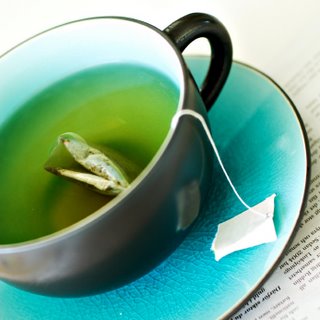 eliminate caffeine before bedtime so that you can sleep soundly Caffeine is a stimulant alkaloid molecule that naturally occurs in many plants that are used for food and beverages. These include coffee, tea (yes, even green tea), and chocolate. Many pharmaceutical drugs and soft drinks are also high in caffeine, as well as popular ‘energy shot drinks.’ Consumer Labs (consumerlabs.com) evaluated 5 Hour Energy, a popular energy shot drink, and found:
“5-Hour Energy…notes that the amount of caffeine is comparable to that in a cup of ‘leading premium coffee.’ ConsumerLab.com found the 2-fluid-ounce bottle to contain 207 mg of caffeine. However, this is 15 percent higher than what you would get from a ‘short’ cup (8 fluid ounces) of a premium coffee such as Starbucks, which Starbucks claims to have 180 mg of caffeine.”
Since the effects of caffeine can last up to 20 hours, having an innocent cup of coffee or energy shot drink, even early in the day, can seriously interfere with sleep, especially for a caffeine sensitive individual. Choose organic decaf coffee or herbal tea instead.
Ellen Kamhi PhD, RN, AHN-BC, AHG, The Natural Nurse®, is a medical school instructor, author and radio/TV host. She has been actively involved in natural medicine since 1964.
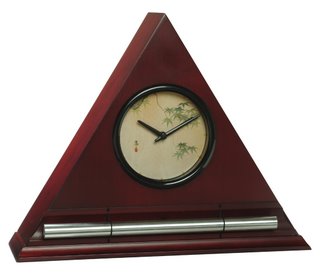 Soothing Chime Alarm Clocks with Acoustic Sounds Lynn Allison is an author, 30 year veteran reporter in the health and fitness field and writes weekly for several national publications.
Now & Zen’s Alarm Clock Shop
1638 Pearl St.
Boulder, CO 80302
(800) 779-6383
Posted in sleep, Sleep Habits
 Floating Away... Ukiyo-e by Takeuchi Keishà Digital Zen Alarm Clock features
1) Alarm Function, features Now & Zen’s signature 10-minute wake up chime sequence—the perfect amount of time for your progressive awakening. The chime strikes gradually increase according to a golden ratio progression, which you can read about on pages 26-28 of the clock’s booklet, available on Now & Zen’s website.
(2) Countdown timer, perfect for meditation, counts backwards from any set time. It can be set from a minimum of 10 seconds to a maximum of 20 hours. When the timer reaches zero it strikes the chime once, and then begins its preprogrammed progression of chime strikes—striking again in 3 minutes, then in one minute—the same progression as the alarm sequence. We usually set ours for 20 minutes, but then linger in meditation for the first few chime strikes once the strike sequence begins.
(3) Interval timer, is perfect for yoga or other practices wherein a periodic reminder can help guide you through the practice. The interval timer uses the same function as the countdown timer except when it counts down to zero, it strikes only once and then begins counting down again from the pre-set time, continuously. We set the interval timer to strike every minute during yoga sessions to signal the time to change positions.
(4) Hour Chime, is a wonderful feature with many uses. The clock can be set to simply chime once on the hour every hour (muted automatically when the alarm is set, so you can sleep). We use this feature in our office to help the day go by, and when it rings on the hour it helps end meetings on time with a crisp “ding”.
 Digital Zen Alarm Clocks, available in maple, walnut, bamboo, and black lacquer
(5) The Chime’s tone, the Digital Zen Clock comes in either a 7 inch “B Tone” or a 9 inch “E Tone” chime. These long-resonating acoustic chimes have been hand tuned using the natural Pythagorean tuning method to produce the same frequencies as the tuning forks used by musical therapists. The chime strike force can be set to “Low” or “High” to create a tone optimal for you.
(6) Power and light, the clock runs on AC power (plug included) or on 2 AA batteries (not included). The LCD display is lighted. When in battery mode the light comes on by touching any button and goes off automatically in 10 seconds to save power. When the clock is plugged in it can be set so that the display light stays on permanently.
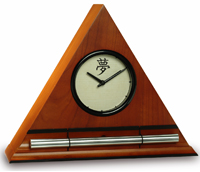 Chime Alarm Clock - Soft Sounds Alarm Clocks Now & Zen’s Acoustic Alarm Clock Shop
1638 Pearl Street
Boulder, CO 80302
(800) 779-6383
Posted in Chime Alarm Clocks, Golden Ratio, Japanese Inspired Zen Clocks, Meditation Timers, Meditation Tools, Natural Awakening, Now & Zen Alarm Clocks, Progressive Awakening, Yoga Timer, Yoga Timers by Now & Zen, Zen Timers
|
|
|
|